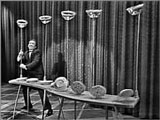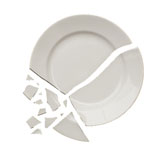|
|
The Plate Spinner Do you remember Eric Brenn, the plate spinner who often performed on the Ed Sullivan Show? Before reading further, click this link to view an incredible YouTube video: http://www.youtube.com/watch?v=Zhoos1oY404 Eric Brenn was an amazingly talented performer who came on stage with a stack of dinner plates and a bunch of long poles. He’d set one plate spinning on top of a pole, then another, then another, until a dozen were going at once. Out of the corner of his eye he’d spot a plate starting to slow and wobble, and he’d dash over to it, furiously spinning it up to speed again. Then he’d spot another and run over to spin it up. Now THAT's entertainment. It’s also a perfect metaphor for my business life these days. I wake each morning, observe the dozen simultaneous projects and ventures that are spinning away, and try to spot the plate that’s about to crash to the floor. That wobbly plate needs to be spun up NOW. Another will likely need attention later this morning, and another this afternoon... I know you can relate! How many plates do you have spinning? A dozen’s about my limit, but I know folks who can handle many more. In this metaphorical context, what constitutes a “Plate?” Certain things are obvious: a major work project, a deal in motion, a sale in process, a document with a deadline, a legal action, and other similarly weighty business-type matters. But the analogy extends beyond the workplace: to charitable projects, social commitments, family matters, personal tasks and many, many more. People talk about “work-life balance” and that’s certainly a thing we’d all like to achieve (even if we don’t know what it really means). I’m far from an expert on this subject, so the last thing you should do is take advice from me. The best I can do is share what I’ve learned by carefully observing Eric Brenn: 1. First thing, you’ve got to get a lot of plates up there. 2. Too many is no good either. 3. Keep an eye on everything. 4. Know when things are getting serious. 5. Move fast. 6. Take the time to resolve each issue before moving on. 7. Put on a good show.
Despite your good intentions and best efforts, sometimes a plate will fall. That’s OK. It’s also OK to decide that you aren’t going to keep a particular one spinning anymore...
|


